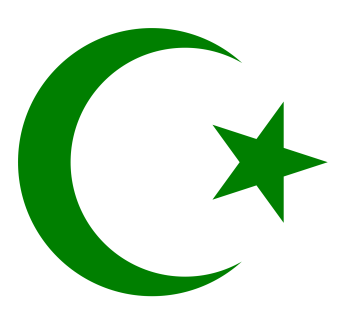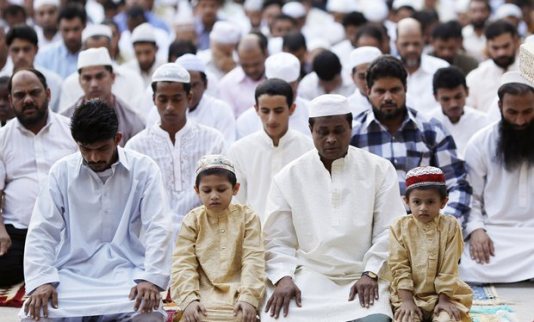
In a mountain outside Mecca in the year 610, a merchant named Muhammed left the hustle and bustle of the prosperous trading city to fast and meditate. Suddenly, a strong, divine presence descended on him, and he heard a voice reciting scripture, supposedly the words of God, and commanding that he commit them to paper. The content of these visions formed the Quran, the basis of the Islamic faith.
Beliefs
Islam started with the Prophet Muhammad in Mecca, but persecution drove him and his followers to Medina in 622. The faith that Muhammad preached rested on Five Pillars[1]:
- Shahadah: “There is none worthy of worship except Allah (الله) and Muhammad is his messenger”
- Salah: practice of praying five times daily
- Zakah [purification, growth]: almsgiving
- Sawm: fasting during Ramadan
- Hajj: an annual pilgrimage to Mecca, which includes tawaf, a circling seven times around the Kaaba (ٱلْكَعْبَة), a building in the most sacred mosque
In addition, Muslims believe in the six articles of faith, arkān al-īmān:
- Belief in the oneness of Allah
- Belief in all the Prophets
- Belief in the Holy Books, including the Quran
- Belief in the Angels
- Belief in the Day of Judgment
- Belief in Taqdeer (Allah’s predestination)
Muslims believe that Islam is the culmination of centuries of prophecy beginning with the first human being Allah created, Adam (ادم). The prophets of Islam mirror many of the prophets in the Jewish Written Torah and Christian Old Testament. Muhammad was the Seal of the Prophets, Khatam a-Nabiyyin.
Holy books
In that cave, the archangel Gabriel revealed to Muhammad the verses of the Quran (القرآن الكريم), the holy book of Islam. The Quran contains 114 suras, or chapters, that delineate the law (Sharia, شريعة), commandments, codes for moral living, and religious philosophy.[2] The suras divide into individual verses called ayaat. In all, the Quran has 6,348 verses.
Since its conception, the Quran has remained unchanged. As Muhammad received the revelation of the Quran in Arabic, many Muslims insist that it is only authentic in Arabic. Translations to other languages are merely interpretations.
The Quran references holy books of other faiths, including the Book of Abraham, believed by the Church of Jesus Christ of the Latter-Day Saints; the Torah of Judaism; the Psalms; and the Gospel of Jesus.[3] While considered revelations from God, these scriptures lack the preserved sanctity of the Quran, leaving it the ultimate message of Allah. Nevertheless, a belief in these past scriptures is integral to belief in the Quran.
Inferior to the Quran is the Hadith, a collection of the words and deeds of the Prophet Muhammad.
Sects
After Muhammad died in 632, Islam split into two main denominations: Sunni and Shia. The two differ mostly in their belief as to whether Muhammad left his son-in-law, Ali, as his successor. Sunni Muslims, who compose over 75% of adherents, believed that the Islamic community should elect an able successor, while the Shia Muslims believed that leadership should remain within Muhammad’s family.
Within the Sunni and Shia denominations, Muslims further branch into several different schools of thought. They constitute about 99% of Muslims worldwide. The other 1% include smaller sects such as Quranists and Kharijite.
Worship
In Islam, worship is a daily, personal practice, not one only performed in a church. Nevertheless, Muslims do have main places of worship, called mosques (مسجد). In Arabic, mosque means “places of prostration.” According to fiqh, the human interpretation of sharia, a building must conform to certain functional and architectural requirements to be considered a mosque. These include sahn, a courtyard for cooling off and ablutions, and mihrab, which indicates the direction of Mecca.
In addition to memorization and recitation of the Quran and observance of the Five Pillars, Muslims worship by “transforming mundane tasks into spiritual ones” [4].
Celebrations
Compared to other faiths, Islam has few official holidays. The dates on the Gregorian calendar change every year, but remain the same on the Islamic calendar, also called the Hijri calendar (التقويم الهجري ). The Hijri calendar is based on the phases of the moon, with 354 or 355 days each year.
The two major festivals of Islam are:
- Eid-Al-Adha (عيد الأضحى): Translated as “Festival of the Sacrifice”, Eid-Al-Adha takes place on the 10th day of the last month. It marks the end of the hajj rites.
- Eid Al-Fitr (عيد الفطر): Translated as “Festival for the Breaking of the Fast”, Eid Al-Fitr marks the end of Ramadan, the ninth month of the Muslim year during which Muslims observe strict daytime fasting.
In addition to these two official festivals, some Muslims may also celebrate “lesser” holidays, such as Mawlid an-Nabi (مَولِد النَّبِي ), which observes the birthday of the Prophet Muhammad.
Islam Today
Worldwide as of 2010, 1.6 billion people identify as Muslims, making it the 2nd largest faith behind Christianity. While often associated with MENA (the Middle East and North Africa), in 2010 that region was home to a little less than 20% of the global Muslim population. Asia-Pacific, a region that includes China, Indonesia, and Australia, is home to the largest number of Muslims, with almost 1 billion, or over 60% of Muslims worldwide, living there.
Each faith has its goals, and in Islam that goal is to satisfy and be approved by Allah. Muslims live to accomplish that task through worship, according to the ayaat: “And I did not create the jinn and mankind except to worship Me” (51:56).

More posts in “World Religions”
[1] Five Pillars of Islam
[2] About the Quran
[3] Divine books in Islam
[4] Worship in Islam
Disclaimer: I am not a religious scholar or theologian, but only a young woman trying to better understand the beliefs of those around me. I do not claim infallibility in my analysis of religion, and apologize for any errors.
That’s quite a precise introduction to Islam. What I like about your writing is that it is derived directly from the authentic sources of Islam. This is important since there are many different beliefs of people these days that often don’t reflect the original teachings of Quran and Hadith. One little correction though: Islam isn’t just practised mainly in Middle East or northern half of Africa. The country with the largest Muslim population is Indonesia. It is followed by Pakistan, India, and Bangladesh — none of which is in the MENA region.
LikeLiked by 2 people
Thank you, Ammar! I’m delighted that you enjoyed my post and that you think I portrayed Islam accurately. So often today the beliefs of other faiths are misunderstood and misinterpreted, and I hoped through this exploration to present true representations of the major five religions. Thank you for that correction on the distribution of Islam; I’ll be sure to edit the post to reflect that statistic.
LikeLiked by 3 people
It was a pleasure reading, Abigail. You’re doing a great job clearing up misconceptions. You can also refer to my blog for more information on Islam, and especially textual references:
http://www.islamexplained.info
LikeLiked by 2 people
Interesting reading. Very objective.
LikeLiked by 2 people
Thank you, englepip! I’m glad to have achieved the objectivity I sought in this “World Religions” series. It’s important to learn about other faiths without imbuing bias in the interpretations. That’s not to say that we need to dispel our own beliefs, but only that we should seek to understand others where they are.
LikeLiked by 3 people
Abigail, I enjoyed the read and gaining some background on the islam faith although i am not religious like my mother am interested in history, background and inquiring knowledge which so many lack.
LikeLiked by 1 person
Thank you for the kind comment, jimberly. I’m glad you enjoyed the post. I certainly enjoyed writing it! The cultures of other peoples is a favorite study of mine. In a globalizing world, understanding one another’s cultures, especially beliefs, is integral to communication.
LikeLiked by 1 person